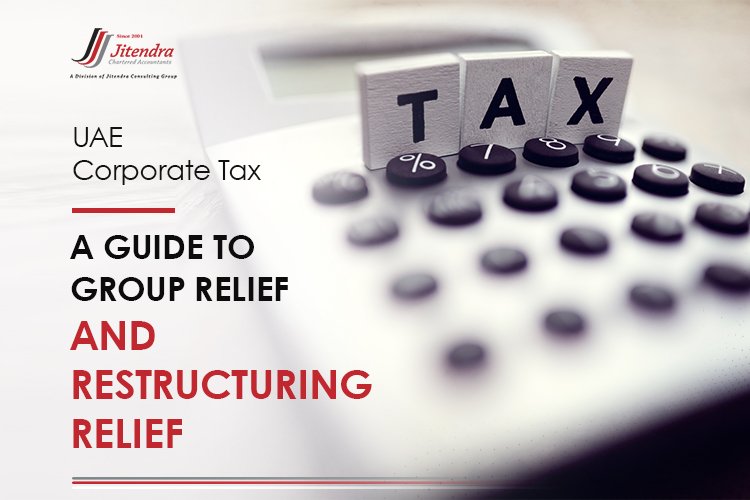
A Guide to Group Relief and Restructuring Relief UAE Corporate Tax
Big corporate groups manage their operations through a cluster of businesses, each of them will have a parent company and a number of subsidiaries. Such companies create tax groups to fence responsibilities and optimise the cost of their total tax compliance. The UAE corporate tax regime, set to take effect from June 1st 2023, allows taxable persons to form a tax group. Corporate tax consultants in Dubai can guide you on the rules governing the creation of corporate tax groups.
The proposed UAE corporate tax regime allows taxable persons to seek group relief in terms of losses, intragroup transactions, and restructurings. Keep reading if you wish to understand more about the proposed group relief and restructuring relief under the regime of corporate tax in the UAE:
Group Relief under the UAE Corporate Tax
Companies reorganise or restructure their business to improve operational efficiency, adapt to economic change or achieve other objectives. When a targeted tax rule is absent, carrying out a restructuring or reorganisation within a group can lead to a tax liability arising on the realisation of gains on assets or liabilities being transferred. This could be undesirable as there is no change in the ultimate ownership of the business or assets being transferred.
The UAE’s proposed corporate tax regime allows companies to reorganise their business without triggering any unnecessary tax charges. The corporate tax regime proposes an exemption or deferral of corporate tax with respect to the transfer of assets or liabilities between members of a tax group. Furthermore, the corporate tax regime will allow companies to carry out certain reorganisation transactions such as mergers on a tax-neutral basis, so that it will not trigger any taxable gain or loss.
Intra-group transfer of assets and liabilities
The proposed corporate tax regime allows intra-group transfer relief for transfers of assets and liabilities between UAE resident companies that are at least 75% commonly owned. However, the assets and/or liabilities being transferred should remain within the same group for at least three years. When you claim an intra-group relief, the relevant assets and liabilities will be treated as being transferred at their tax net book value.
This means they don’t need to take into account either a gain or a loss while calculating the taxable income of the transferor and the transferee company. If the business doesn’t meet the conditions for availing intra-group relief, any gain or loss that would have arisen upon the initial transfer will need to be calculated and included in the transferor’s tax return in the tax period in which the conditions ceased to be met. Corporate tax advisors in Dubai can further advise you on intra-group relief.
Restructuring Relief under the UAE Corporate Tax
The UAE corporate tax regime exempts or allows for a deferral of taxation if a whole business, or independent parts of a business, are transferred in exchange for shares or other ownership interests. This type of corporate tax restructuring relief will facilitate mergers, spin-offs and other corporate restructuring transactions. For example, an individual carrying out a business contributes his business to a newly incorporated company in exchange for shares in the company.
In such a case, that individual can avail of corporate tax exemption with respect to any gain on the transfer, and the acquiring company can continue with the transferor’s existing tax basis in the transferred assets and liabilities. Assets and liabilities being transferred as part of a qualifying restructuring will be considered to be transferred at their tax net book value. This will help the businesses to avoid reporting for a gain or loss for calculating taxable income. Corporate tax consultants in Dubai can assist you with this further.
Can the Authority Claw Back a Restructuring Relief?
The restructuring relief will be clawed back if the business is subsequently transferred to a third party within three years of restructuring. In this case, any gain or loss that would have triggered the initial transfer would be required to be calculated and included in the tax return for the tax period of the third-party disposal. Availing of corporate tax consulting services in Dubai can help you deal with such a situation.
Consult with the Best Corporate Tax Consultants in Dubai, UAE
Companies do not have much time left for corporate tax preparation in the UAE as we are inching closer to June 2023. However, you can start your UAE corporate tax preparation now with the help of the best corporate tax consultants in Dubai such as Jitendra Chartered Accountants (JCA). Passing the baton to JCA’s corporate tax advisors in Dubai will help you stay ready when the government releases the UAE Corporate Tax Law.
JCA’s corporate tax consulting services in Dubai cover CT Assessment & Advisory Services (one-time or retainer basis), CT Compliance Services & CT Agent Services to Represent to Federal Tax Authority (FTA) of UAE in case of any notices served by FTA. Ensure corporate tax compliance and avoid relevant penalties by availing of JCA’s corporate tax services in Dubai, UAE. Talk to our consultants for tax solutions that you can count


